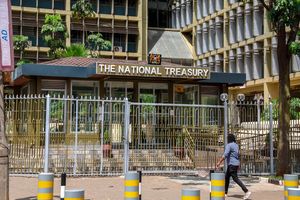
The National Assembly wants to strip the Treasury Cabinet Secretary of power to grant tax exemptions.
The National Assembly wants to strip the Treasury Cabinet Secretary of power to grant tax exemptions, as it emerged that the government lost over Sh300 billion in Value-Added Tax (VAT) exemptions in the current financial year.
The VAT exemptions were granted to some local manufacturers at a time when the country was struggling with expensive commercial loans procured locally and in foreign markets to finance government operations.
Budget and Appropriations Committee chairman Samuel Atandi (Alego Usonga), in an interview with the Nation, said that it is popular among MPs that the powers to grant the tax exemptions be vested in the National Assembly as the only organ of government with the power of the purse.
“As a committee, we will be studying the Finance Bill 2025 once published with a view to amending the VAT Act among other laws so that we have a situation where it is only the National Assembly that has the powers to grant the tax exemptions,” said Mr Atandi.
“We are a House charged with approving revenue collection measures to finance the budget. We will not sit back, allow them to abuse the tax exemptions measure, and take the flak from the public over punitive taxes.”
Mr Atandi said that previous National Treasury CSs have abused their powers “as they went on an overdrive to grant exemptions to entities that did not deserve.”
“We know they have abused those powers. There is no point granting the exemptions while targeting Kenyans with punitive tax measures to finance government operations.”
However, limiting zero-rating and removal of some exemptions outside agriculture could raise VAT as a share of GDP but such a move may prove unpopular.
The Finance and National Planning Committee of the National Assembly is currently investigating how 14 local companies were granted VAT exemptions to the tune of Sh15 billion at a time when the country is facing a difficult time raising revenues to finance its operations.
The Finance committee chaired by Molo MP Kuria Kimani seeks to establish whether the companies with a claimed cumulative capital investment of Sh93.53 billion, merited the exemptions.
“It will be bad for this House if we continue to do the same knowing very well that we are unable to raise revenues.”
The government is projecting to raise Sh2.8 trillion in ordinary revenue in the next financial year to finance the Sh4.2 trillion budget with the deficit to be plugged through grants and borrowings from the local and foreign market.
“We will never achieve this with these exemptions. These exemptions must be thoroughly scrutinised before the Bill is brought to this House,” the Alego Usonga MP said.
Mr Atandi spoke as a document by the Parliamentary Budget Office that advises Parliament and its committees on fiscal matters, showing that as of 2020 tax expenditure on VAT, lost revenue due to exemptions and zero rating stood at Sh234 billion.
“Therefore, a review of the list of exempt goods outside agriculture coupled with limiting the number of zero-rated goods could increase revenue as a share of GDP by 0.5 percent,” the Parliamentary Budget Office document states.
Mr Atandi went on to “beseech this House that in future, we should never allow exemptions that cannot be explained.”








